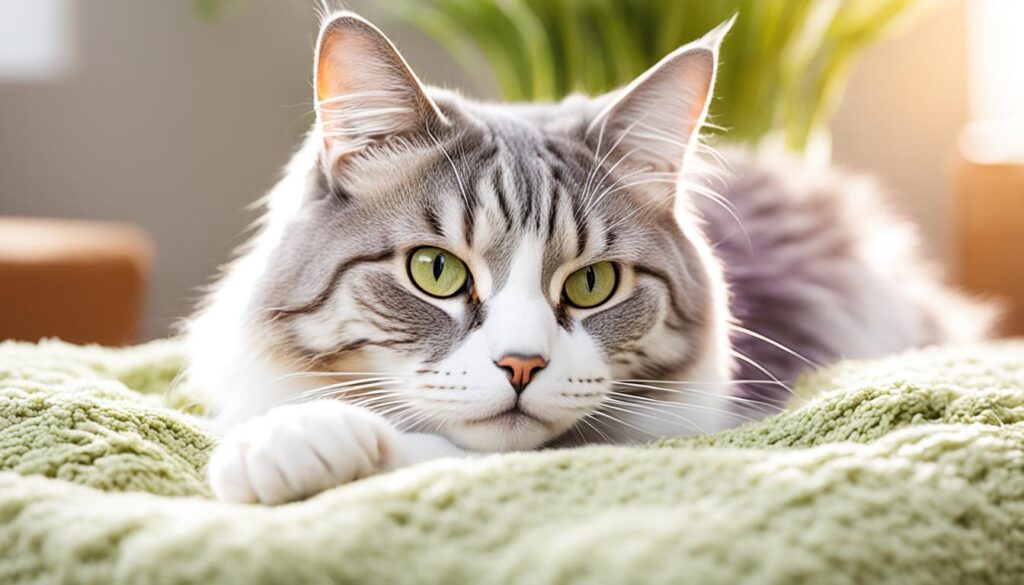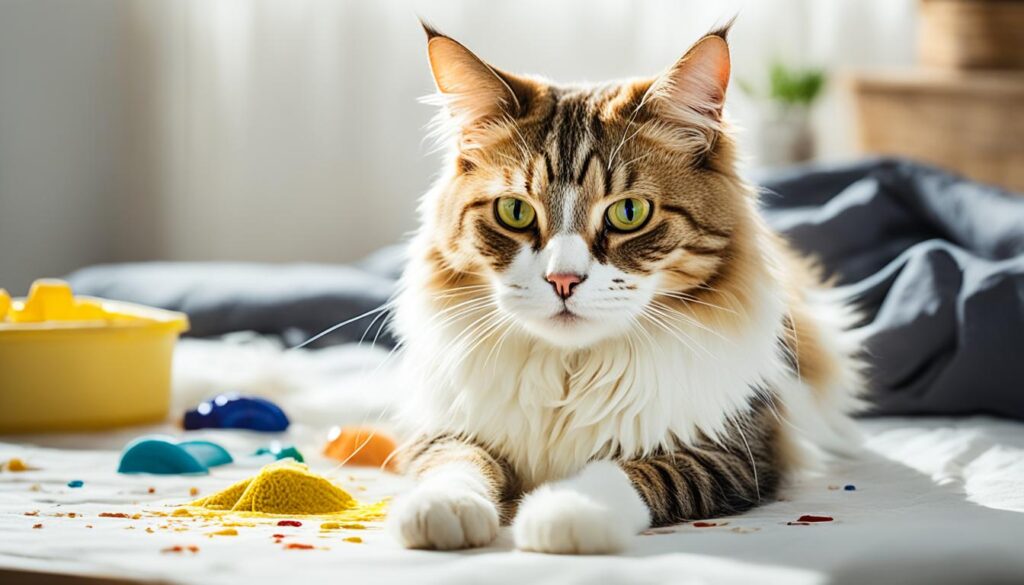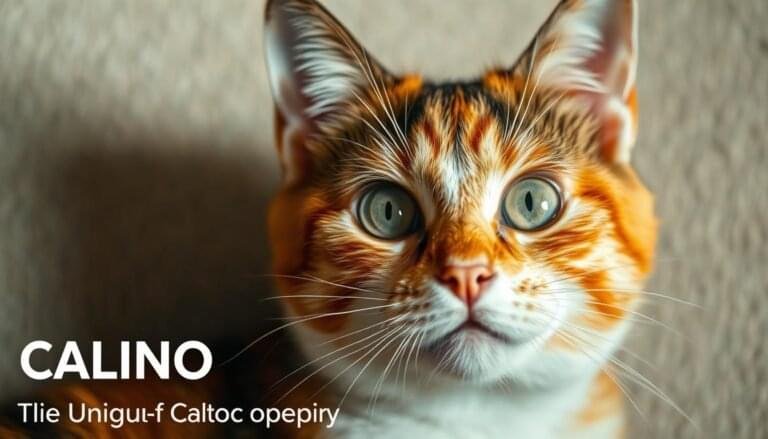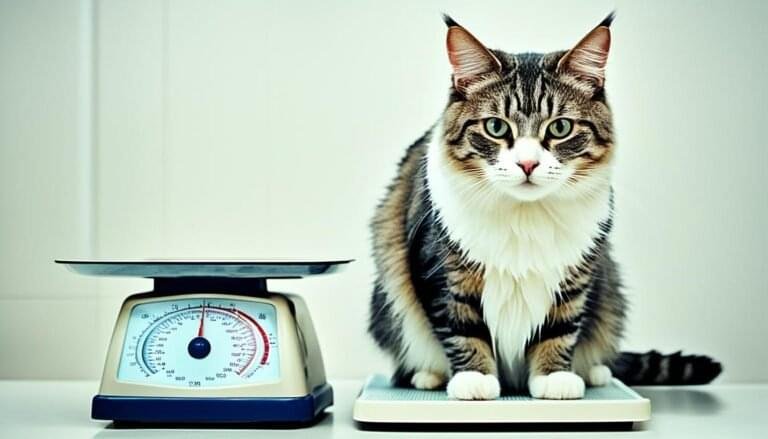Did you know that approximately 10% of cats experience urinary issues at some point in their lives?
One of the most common and frustrating problems cat owners face is their furry friend urinating outside the litter box. As much as we love our cats, this behavior can be puzzling and stressful for both the cat and the owner.
If you’re dealing with a cat who seems to have developed a habit of peeing everywhere except the litter box, it’s essential to understand the reasons behind this behavior. By unraveling the mystery, you can find effective solutions and bring harmony back to your home.
Key Takeaways:
- Inappropriate urination is a common problem faced by cat owners.
- Understanding the reasons behind your cat’s behavior is crucial for finding effective solutions.
- Medical conditions and behavioral factors can contribute to a cat urinating outside the litter box.
- Creating a suitable litter box environment and managing stress and anxiety can help prevent inappropriate urination.
- Proper cleaning techniques are essential to prevent repeat incidents and maintain a clean and odor-free home.
The Prevalence of Cat Urinary Tract Diseases
Cat urinary tract diseases are a common concern among cat owners, with approximately 1.5% of all cats in the United States suffering from these conditions. Cats experiencing urinary tract issues may exhibit inappropriate urination behavior, such as urinating outside the litter box or peeing on the bed. Unfortunately, there is often no known cause, prevention, or cure for these diseases, making them even more challenging to manage.
Image:
Inappropriate urination is a significant problem that can lead to frustration and stress for both cats and their owners. It is important to address this issue proactively to prevent cats from being surrendered to animal shelters due to their urination habits.
To create a better understanding of the prevalence of cat urinary tract diseases, let’s take a closer look at the causes of cat inappropriate urination, as well as available solutions to help owners and their feline companions overcome this challenge.
Medical Causes of Inappropriate Urination
Inappropriate urination in cats can be caused by various medical conditions that affect their urinary tract. It is essential to consider these medical causes before assuming behavioral issues as the primary reason for the behavior. By identifying and addressing these underlying medical conditions, cat owners can effectively manage their cat’s inappropriate urination problem.
Common Medical Causes of Inappropriate Urination
There are several medical conditions that can lead to cats urinating outside the litter box:
- Urinary Tract Infections (UTIs): Bacterial infections in the urinary tract can cause discomfort and urge the cat to relieve itself outside the litter box.
- Bladder Stones: The presence of bladder stones can irritate the bladder and make urination painful for cats, resulting in inappropriate elimination.
- Idiopathic Cystitis: This condition, also known as sterile cystitis, causes bladder inflammation and discomfort, leading to inappropriate urination.
- Metabolic Diseases: Certain metabolic disorders, such as diabetes or kidney disease, can affect a cat’s urinary habits and cause inappropriate urination.
It is important for cat owners to consult with a veterinarian to determine if any of these medical conditions are causing their cat to urinate outside the litter box. The veterinarian may recommend diagnostic tests such as urine analysis, blood tests, or imaging to identify the underlying medical cause.
Treatment of Medical Causes
Treating medical causes of inappropriate urination typically involves addressing the specific condition that is affecting the cat’s urinary tract. Treatment options may include:
- Antibiotics or medications to treat urinary tract infections
- Dietary changes or medication to dissolve or remove bladder stones
- Pain management and anti-inflammatory medications for idiopathic cystitis
- Managing underlying metabolic diseases through medication, diet, or lifestyle adjustments
By effectively treating the medical causes of inappropriate urination, cat owners can improve their cat’s urinary health and prevent further instances of inappropriate elimination.
| Medical Cause | Symptoms | Treatment |
|---|---|---|
| Urinary Tract Infections (UTIs) | Frequent urination, straining to urinate, blood in urine | Antibiotics to eliminate the infection |
| Bladder Stones | Increased frequency of urination, pain while urinating | Dietary changes to dissolve stones or surgical removal |
| Idiopathic Cystitis (Sterile Cystitis) | Frequent urination, discomfort during urination | Pain management, anti-inflammatory medication |
| Metabolic Diseases | Increased thirst, weight loss, changes in appetite | Medication, dietary adjustments, disease management |
The Dreaded “Behavioral” Diagnosis
Cats don’t pee outside the litter box because they are angry or vengeful. Inappropriate urination is often a sign of anxiety or stress in cats. Treating these cats usually involves addressing the underlying stressors and providing a comfortable and safe litter box environment.
- Create a calm and peaceful environment for your cat. Minimize loud noises and provide hiding spots or vertical spaces where your cat can retreat.
- Ensure that your cat’s litter box is clean and easily accessible. Use unscented litter and avoid covered litter boxes, as some cats may feel trapped or overexposed.
- Place multiple litter boxes throughout your home, especially in multi-level houses or larger living spaces. This gives your cat options and prevents them from avoiding the litter box due to distance.
- Provide a variety of litter box types to cater to your cat’s preferences. Some cats prefer covered boxes, while others prefer open ones. Experiment with different sizes and styles to find what works best for your cat.
- Use positive reinforcement to encourage your cat to use the litter box. Reward them with treats or praise when they use it correctly. Avoid punishment or scolding, as it may exacerbate their anxiety.
Example Litter Box Schedule:
Creating a litter box schedule can help establish routine and reduce stress for your cat. Here’s an example:
| Time | Activity |
|---|---|
| 8:00 AM | Clean all litter boxes |
| 8:30 AM | Feed your cat |
| 9:00 AM | Encourage your cat to use the litter box |
| 12:00 PM | Check and clean litter boxes if necessary |
| 6:00 PM | Feed your cat |
| 7:00 PM | Play and interact with your cat |
| 9:00 PM | Encourage your cat to use the litter box |
By following these tips and implementing a consistent litter box routine, you can help reduce your cat’s anxiety and prevent inappropriate urination outside the litter box.
Litter Box Issues and Solutions
Cats can sometimes develop problems with using their litter box, leading to them urinating outside the box. There are several factors that may contribute to this behavior, including:
- A dirty litter box
- The wrong type of litter
- An inappropriate location
- Inadequate privacy
Addressing these issues can help prevent inappropriate urination and encourage your cat to use the litter box correctly.
Keeping the litter box clean: Cats are clean animals and may avoid a dirty litter box. Scoop the litter box at least once a day and change the litter regularly to keep it clean and odor-free.
Using the preferred litter type: Cats have preferences when it comes to litter. Experiment with different types to find the one your cat likes best. Some cats prefer clumping litter, while others may prefer non-clumping or natural alternatives.
Providing a quiet and accessible location: Choose a quiet area of your home for the litter box where your cat can use it without feeling anxious or interrupted. Ensure that the litter box is easily accessible for your cat, particularly for older cats or those with mobility issues.
Ensuring privacy: Cats value privacy when using the litter box. Place the litter box in a location that is away from high-traffic areas and household noise. Consider using a covered litter box or creating a private space using a decorative screen or furniture to give your cat the privacy they need.
By addressing these litter box issues, you can create a more appealing and suitable environment for your cat, reducing the likelihood of inappropriate urination. Remember, each cat is unique, so it may take some trial and error to find the right solutions that work for your furry friend.
Managing Stress and Anxiety in Cats

Cats may exhibit inappropriate urination behavior, such as urinating outside the litter box, when they experience stress or anxiety. Changes in the household, such as the introduction of new pets, new family members, or alterations in routine, can trigger these feelings of unease in cats. As responsible pet owners, it is important to understand how to manage and reduce stress in our feline companions to prevent this behavior.
To help alleviate stress and anxiety in cats, several strategies can be implemented:
- Create a safe and predictable environment: Cats feel more secure when they have a consistent routine and a designated space to call their own. Ensuring they have their own hiding spots, beds, and access to elevated areas can help alleviate stress.
- Provide vertical space and enrichment: Cats have a natural instinct to climb and explore their surroundings. Installing cat trees or shelves can give them the opportunity to perch and observe their environment, reducing stress and promoting mental stimulation.
- Consider behavioral modification techniques: Working with a professional animal behaviorist can help address underlying behavioral issues contributing to stress in cats. They may recommend techniques such as counter-conditioning or desensitization to help the cat associate positive experiences with previously stressful situations.
- Explore medication options: In some cases, cats may require medication to manage severe stress or anxiety. Discussing this with a veterinarian is essential, as they can prescribe appropriate medications and monitor their effects.
Suggested Toys and Enrichment Products for Stress Relief:
Providing appropriate toys and enrichment products can significantly reduce stress and anxiety in cats. Interactive toys that stimulate their hunting instincts, such as puzzle feeders, treat-dispensing toys, and feather wands, can help alleviate boredom and redirect their energy in a positive way.
| Product | Description |
|---|---|
| Aromatherapy Diffuser | |
| Interactive Puzzle Feeder | |
| Comforting Calming Bed |
Using pheromone diffusers or sprays, like the Aromatherapy Diffuser, can also create a calming environment for cats. These products release synthetic pheromones that mimic the natural pheromones produced by mother cats, helping to reduce stress and promote relaxation.
Remember, every cat is unique, and it may take time and patience to find the most effective stress management techniques for your furry friend. By understanding and addressing the underlying causes of stress and anxiety, we can help our cats feel more comfortable in their environment and reduce the likelihood of inappropriate urination behavior.
Dealing with Separation Anxiety

Cats with separation anxiety can exhibit distressing behaviors, such as urinating on the bed or other personal belongings when their owners are away. This behavior is often a cry for help and a manifestation of their anxiety. Understanding and addressing separation anxiety is essential to help cats feel more secure and prevent further inappropriate urination incidents.
Creating a Secure and Comforting Environment
One of the key strategies in managing separation anxiety is to create a safe and reassuring environment for your cat. Provide them with a designated area where they feel secure, such as a cozy bed or a separate room with their favorite toys and a comfortable hiding spot. This designated space can serve as their sanctuary, promoting feelings of safety even when you’re not around.
Maintaining Routines
Cats thrive on routine and predictability. Establishing a consistent schedule for feeding, playtime, and interaction can help alleviate separation anxiety. Try to stick to these routines as closely as possible, even when you have to leave the house. This familiarity can provide a sense of stability for your cat and reduce their anxiety levels.
Considering Medication or Behavior Modification Techniques
In severe cases of separation anxiety, medication prescribed by a veterinarian may be necessary to help your cat manage their anxiety. Anti-anxiety medications can help alleviate symptoms and promote a calmer state of mind. Additionally, consulting with a professional animal behaviorist or cat trainer can provide valuable insights and techniques to modify your cat’s behavior and help them cope with separation anxiety.
Solutions for Separation Anxiety in Cats
| Solution | Description |
|---|---|
| Creating a Safe Space | Designate an area where your cat feels secure and can retreat to when you’re not around. |
| Maintaining a Consistent Schedule | Establish and stick to a routine for feeding, playtime, and interaction to provide predictability. |
| Medication | Consult with a veterinarian to explore the option of anti-anxiety medication. |
| Behavior Modification Techniques | Seek guidance from a professional behaviorist or trainer for specialized strategies to manage separation anxiety. |
By implementing these solutions, you can help reduce separation anxiety in your cat and minimize the chances of them urinating on your bed or personal belongings. Remember, patience, consistency, and understanding are key when dealing with separation anxiety in cats.
Proper Cleaning Techniques to Prevent Repeat Incidents
Cleaning up cat urine accidents thoroughly is essential to prevent repeat incidents. When cats can still smell their urine, they may be inclined to urinate in the same spot again. To ensure effective cleaning, it is recommended to use enzymatic cleaners designed specifically for removing cat urine odor and stains.
Enzymatic cleaners contain enzymes that break down the chemical components of urine, effectively eliminating both the odor and the potential attraction for cats to re-mark the same area. These cleaners are readily available at pet stores and online, and they are safe to use on various surfaces, including carpets, upholstery, and hardwood floors.
Here are some steps to follow when cleaning up cat urine:
- Blot up as much urine as possible using absorbent materials like paper towels or clean cloth.
- Rinse the affected area with cold water to dilute the urine and further remove any traces.
- Apply the enzymatic cleaner generously to the urine-affected area, ensuring it covers the entire spot.
- Follow the instructions provided by the cleaner manufacturer, as different products may have specific application and drying times.
- Allow the enzymatic cleaner to sit on the area for the recommended duration to ensure optimal enzymatic activity.
- Gently blot up the excess cleaner after the recommended time has passed.
- Allow the area to air dry completely. Avoid using heat sources such as hairdryers, as heat can set the stain and odor.
By following these proper cleaning techniques, you can effectively eliminate the scent of cat urine and minimize the risk of repeat incidents. Remember to always check the cleanliness of your cat’s litter box and address any behavioral or medical issues to prevent further inappropriate urination.
Conclusion
Understanding the underlying causes of a cat’s inappropriate urination is essential for effectively managing this common issue. By addressing both medical and behavioral factors, providing a suitable litter box environment, managing stress and anxiety, and implementing proper cleaning techniques, cat owners can take proactive steps to prevent and reduce their cat’s urinary issues.
When faced with a cat urinating outside the litter box, it is important to rule out any medical conditions that may be causing the behavior. Consulting with a veterinarian can help identify and treat any underlying urinary tract infections, bladder stones, or other medical issues that may be contributing to the problem.
In addition to addressing medical causes, it is crucial to consider the cat’s behavioral and environmental needs. Ensuring the litter box is clean, using the preferred litter type, and providing a quiet and accessible location for the litter box can help encourage proper elimination behavior. Managing stress and anxiety through the creation of a safe and predictable environment, enrichment activities, and, if necessary, behavioral modification techniques or medication can also contribute to reducing inappropriate urination in cats.
Finally, implementing proper cleaning techniques is essential to prevent repeat incidents. Using enzymatic cleaners specifically designed to eliminate cat urine odor and stains can help remove any lingering scent that may attract cats to urinate in the same spot again. By taking these proactive measures, cat owners can create a healthier and more harmonious environment for their feline companions, preventing cat spraying indoors and effectively managing cat elimination problems.
FAQ
Why is my cat peeing everywhere?
What are the causes of cat inappropriate urination?
How can I stop my cat from peeing on furniture?
Why is my cat peeing on the carpet?
What are the solutions for a cat peeing on the bed?
How can I deal with cat marking behavior?
How can I prevent my cat from spraying indoors?
What are the common cat urinary issues?
What are some tips for managing cat elimination problems?
References
| International Cat Association (TICA) | https://www.tica.org/ |
| The Cat Fanciers’ Association (CFA) | https://cfa.org/ |
| World Cat Federation (WCF) | https://www.wcf-online.de/ |
| Fédération Internationale Féline (FIFe) | https://www.fifeweb.org/ |







